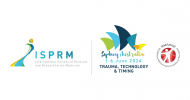Session outline
The Disaster Rehabilitation Committee (DRC) of ISPRM is a dedicated and multidisciplinary group of healthcare professionals, researchers, and advocates with a shared mission to promote and advance the field of disaster rehabilitation. The committee has been actively engaged in addressing the critical need for early coordinated medical rehabilitation in both natural and man-made disasters.
As part of its ongoing commitment to raising awareness and disseminating essential knowledge, the DRC has a longstanding tradition of organizing annual scientific sessions at the Annual ISPRM Congresses. The annual scientific sessions have become a significant event within the disaster rehabilitation community, drawing together experts, practitioners, policymakers, and researchers from various parts of the world. These sessions are designed to facilitate the exchange of ideas, best practices, and research findings related to disaster rehabilitation, ultimately contributing to improved outcomes for disaster survivors.
Workshop Outline:
1. Introduction (5 minutes)
- Welcome and overview of the workshop’s objectives.
- Brief introduction of the DRC leadership, speakers and their expertise in disaster rehabilitation.
2. Setting Up Disaster Rehabilitation Special Interest Groups (DRSIG) – Australia
- Speaker: Dr Sumitha Gounden, Australia
- Presentation on the barriers faced and lessons learned while establishing DRSIG in Australia.
- Highlight the importance of collaboration and preparedness in disaster rehabilitation.
3. Traumatic Brain Injury Rehabilitation (8 minutes)
- Speaker: Dr Maria Paul, Australia
- Didactic lecture on the challenges and best practices in traumatic brain injury rehabilitation post-disaster.
- Discuss innovative approaches and cutting-edge research in this field.
4. Amputee Rehabilitation after Disasters (8 minutes)
- Speaker: Dr David Crandell, USA
- Presentation on the unique challenges and solutions in providing rehabilitation for amputees in disaster-affected areas.
- Share insights into prosthetic technology and psychosocial support.
5. Utilizing Satellite Data for Disaster Rehabilitation (8 minutes)
- Speaker: Satoshi Hayamizu, MD, Japan
- Discuss the integration of satellite data with public health initiatives to enhance disaster rehabilitation efforts.
6. Rehabilitation for Trauma and Torture Victims (8 minutes)
- Speaker: Dr Taslim Uddin, Bangladesh
- Presentation on the critical role of rehabilitation in restoring the physical and mental health of trauma and torture victims.
- Share experiences and best practices from different regions.
7. Managing Spinal Cord Injuries in Natural Disasters (8 minutes)
- Speaker: Dr. Shaun XIONG, New Zealand
- In-depth discussion on the challenges and practical considerations in caring for patients with spinal cord injuries in disaster settings.
- Highlight successful case studies and strategies for improving outcomes.
8. Current Updates and Future Trends in Disaster Rehabilitation (8 minutes)
- Speaker: Dr Amatya Bhasker, Australia
- Provide an overview of the latest developments and future directions in disaster rehabilitation research and policy.
- Encourage collaboration and innovation in the field.
9. Ukraine Rehabilitation Response Update (8 minutes)
- Speaker: Representative from Ukraine
- Share recent updates on the rehabilitation response efforts in Ukraine, highlighting the ongoing challenges and successes.
10. Interactive Q&A Session (5 minutes)
- Open the floor for questions and discussions, allowing the audience to engage with the speakers.
Learning outcomes
Learning Outcome 1:
By the end of this session, participants will be able to identify and analyze the key challenges and barriers associated with providing early coordinated medical rehabilitation in both natural and man-made disasters and propose innovative solutions to address these challenges.
Learning Outcome 2:
After attending this session, participants will have a comprehensive understanding of the latest research findings, technologies, and best practices in disaster rehabilitation, enabling them to enhance the quality of care and support they provide to disaster-affected populations in their respective roles and settings.
Learning Outcome 3:
Upon completion of the session, participants will be equipped with the knowledge and insights necessary to advocate for the integration of rehabilitation services into disaster response and recovery plans at both the local and global levels, contributing to the advancement of policies that prioritize the well-being and functional recovery of disaster survivors.
Target audience
The workshop is designed to benefit a diverse audience, including medical students, residents, and faculty members. It will provide valuable insights and practical knowledge that can be applied in both educational and clinical settings. The multidisciplinary nature of disaster rehabilitation makes this workshop relevant to a wide range of healthcare professionals and researchers.
We look forward to bringing together experts from around the world to share their knowledge and experiences, ultimately advancing the field of disaster rehabilitation and improving outcomes for individuals affected by disasters globally.



